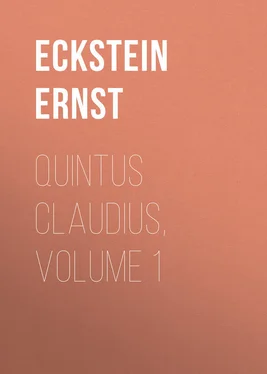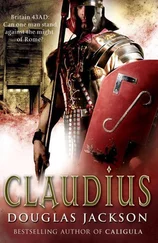Ernst Eckstein - Quintus Claudius, Volume 1
Здесь есть возможность читать онлайн «Ernst Eckstein - Quintus Claudius, Volume 1» — ознакомительный отрывок электронной книги совершенно бесплатно, а после прочтения отрывка купить полную версию. В некоторых случаях можно слушать аудио, скачать через торрент в формате fb2 и присутствует краткое содержание. Жанр: foreign_antique, foreign_prose, на английском языке. Описание произведения, (предисловие) а так же отзывы посетителей доступны на портале библиотеки ЛибКат.
- Название:Quintus Claudius, Volume 1
- Автор:
- Жанр:
- Год:неизвестен
- ISBN:нет данных
- Рейтинг книги:4 / 5. Голосов: 1
-
Избранное:Добавить в избранное
- Отзывы:
-
Ваша оценка:
- 80
- 1
- 2
- 3
- 4
- 5
Quintus Claudius, Volume 1: краткое содержание, описание и аннотация
Предлагаем к чтению аннотацию, описание, краткое содержание или предисловие (зависит от того, что написал сам автор книги «Quintus Claudius, Volume 1»). Если вы не нашли необходимую информацию о книге — напишите в комментариях, мы постараемся отыскать её.
Quintus Claudius, Volume 1 — читать онлайн ознакомительный отрывок
Ниже представлен текст книги, разбитый по страницам. Система сохранения места последней прочитанной страницы, позволяет с удобством читать онлайн бесплатно книгу «Quintus Claudius, Volume 1», без необходимости каждый раз заново искать на чём Вы остановились. Поставьте закладку, и сможете в любой момент перейти на страницу, на которой закончили чтение.
Интервал:
Закладка:
And in fact these portraits were well worthy of study, for they were an epitome of a portion of the history of the world. Those stern, inexorable features were those of Appius Claudius Sabinus, who, as consul, wreaked such fearful justice on his troops. Beside him stood his brother, the haughty patrician, Caius Claudius, knitting his thick brows – an embodiment of the protest of the nobles against the rights contended for by the popular party. There was the keen, eagle face of the infamous Decemvir, the persecutor of Virginia – a villain, but a daring and imperious villain. – Claudius Crassus, the cruel, resolute foe of the plebeians – Appius Claudius Caecus, who made the Appian Way – Claudius Pulcher, the witty sceptic, who flung the sacred fowls into the sea because they warned him of evil – Claudius Cento, the conqueror of Chalcis – Claudius Caesar, and a hundred other world-renowned names of old and modern times… What an endless chain! And just as they now looked down, head beyond head from their frames, they had been, all without exception, stiff-necked contemners of the people, and staunch defenders of their senatorial privileges. A splendid, defiant and famous race! Even the tattooed native of Britain, 132 132 Tattooed native of Britain. The original Celtic inhabitants of England. For the impression made by Roman magnificence on the British chieftain Caractacus, see Dio Cass. LX, 33.
who came to offer fine amber chains 133 133 Amber chains. Amber ( Electrum ) was greatly admired by the Romans for necklaces, rings and bracelets, until its value decreased by over-importation. It was chiefly brought from the shores of the Baltic.
and broken rings of gold, 134 134 Broken rings of gold. The priest of Jupiter was only permitted to wear broken rings of gold, as closed ones were the symbols of captivity.
was sensible of an atmosphere of historic greatness.
One after another – the humbler folks in parties together – the visitors were led from the atrium into the carpeted reception-room, where the master of the house stood to welcome them in robes of dazzling whiteness 135 135 Robes of dazzling whiteness. The white toga was the invariable gala dress worn at all ceremonious receptions, even by the emperors. Great indignation was felt against Nero, because once, when the senate paid him a visit, he wore only a flowered toga.
and wearing his priestly head-gear. 136 136 Priestly head-gear. The Flamines were forbidden to go bare-headed. They always wore a hat ( apex ) or a sort of fillet.
He had already dismissed a considerable number of important personages, when a tall officer, stout almost to clumsiness, was announced and at once admitted, interrupting as he did the strict order of succession. This was no less a person than Clodianus, the adjutant of Caesar himself. He came in noisily, embraced and kissed the priest and then, glancing round at the slaves, asked if he might be allowed a few words with Titus Claudius in private. The priest gave a sign; the slaves withdrew into a side room.
“There is no end to it all!” cried Clodianus, throwing himself into a large arm-chair. “Every day brings some fresh annoyance!”
“What am I to hear now?” sighed the high-priest.
“Oh! this time it has nothing to do with the outbreak among the Nazarenes and all the troubles of these last weeks. We can detect here and there extraordinary symptoms, and fabulous rumors … for instance … but, your word of honor that you will be silent…!”
“Can you doubt it?”
“Well, for instance, it sounds incredible … but Parthenius 137 137 Parthenius. This historical personage was a man of conspicuous importance at the court of Domitian, and mentioned by many authors, particularly in Martial’s epigrams. He was cubiculo praepositus , (πρόκεντος in Dio Cass.) groom of the bed-chamber or high chamberlain, and a particular favorite with Caesar. His companion in office Sigerus or Sigerius, his inferior in rank, power and influence, will not be again mentioned in this story.
brought it all from Lycoris the fair Gaul… It is said that this Nazarene craze has seized the very highest personages… They even name…”
He stopped and looked round the room, as if he feared to be overheard.
“Well?” said the high-priest.
“They name Titus Flavius Clemens, 138 138 Titus Flavius Clemens. A cousin of the emperor, was consul A.D. 95 with Domitian, (who conferred this dignity upon him seventeen times). Concerning his conversion to Christianity see Dio Cass. LXVII, 14, as well as Suet. Dom. 15.
the Consul…”
“Folly! a relation of Caesar’s. The man who spreads such a report should be found out and brought to condign punishment…”
“Folly! that is what I said too! Infernal nonsense. Still the story is characteristic, and proves what the people conceive of as possible…”
“Patience, patience, noble Clodianus! Things will alter as winter approaches. The wildest torrent may be dammed up. But we are digressing – what new annoyance?”
“Ah! to be sure,” interrupted Clodianus. “Then nothing of it has reached your ears?”
“No one has mentioned anything to me.”
“They dare not.”
“And why?”
“Because your views are well known. They know that you hate the populace – and the populace yesterday achieved a triumph.”
“And in what way?” asked Claudius frowning.
“In the circus. 139 139 In the circus. The Circus Maximus, between the Aventine and Palatine Hills, was the principal place for the horse and chariot races, and in Domitian’s time accommodated about a quarter of a million spectators.
I can tell you, my respected friend, it was a frightful scandal, a real storm in miniature! Caesar turned pale – nay he trembled.”
“Trembled!” cried Claudius indignantly.
“With rage of course,” said Clodianus in palliation. “The thing occurred thus. One of the charioteers 140 140 Charioteers. As the givers of entertainments could rarely furnish men and horses enough of their own for the games in the circus, companies of capitalists and owners of larger families of slaves and studs, undertook to supply them. As there were usually four chariots in each race, there were four such companies, each of which furnished a chariot for each race, and as the chariots and drivers had colors to distinguish them, each adopted one of these colors, hence they were called factions or parties. (Friedlander, II, 192.) The colors of these four parties were white, red, green and blue. Domitian added two new ones, gold and purple. Like so many of Domitian’s institutions, this circus innovation passed without leaving any trace, but the original parties, especially the green and the blue, lasted for centuries. The whole population of Rome, and afterwards that of Constantinople, divided into different parties, each of which sided with one of these circus factions. The eager, even passionate interest with which this was done, finds a feeble analogy at the present day in some phases of English and American popular life.
of the new party – those that wear purple – drove so magnificently, that Caesar was almost beside himself with delight. By Epona, the tutelary goddess of horses! 141 141 By Epona, the tutelary goddess of horses! Epona (from epus-equus , the horse) was the protecting deity of the horse, mule and donkey. (Juv. Sat. VIII, 157.) Stables, etc., were adorned with her statue. Roman sportsmen swore by the goddess of horses. (See Juv. Sat. VIII, 156: jurat solam Eponam .)
but the fellow drove four horses that cannot be matched in the whole world. Incitatus, 142 142 Incitatus, the swift — equo incitato – in a stretching gallop – a famous favorite horse of the emperor Caligula. (Suet. Cal. 55.) The emperor built this animal a palace, gave orders that it should feed from an ivory manger, and be attended by slaves clad in rich garments. When it was to appear in the circus, all noise in its neighborhood was prohibited during the whole of the preceding day, that the noble creature’s rest should not be disturbed. Caligula is said to have intended to make his Incitatus consul.
old Caligula’s charger, was an ass in comparison, and the names of those splendid steeds are in every one’s mouth to-day like a proverb: Andraemon, Adsertor, Vastator and Passerinus 143 143 Andraemon, Adsertor, Vastator and Passerinus. Names of horses frequently mentioned during the reign of the Roman emperors. Andraemon often won the race in Domitian’s time. Monuments with the portrait of this racer have come down to us.
– you hear them in every market and alley; our poets might almost be envious. And the charioteer too, a free Greek in the service of Parthenius the head chamberlain, is a splendid fellow. He stood in his quadriga 144 144 Quadriga. A carriage in front of which four horses were fastened abreast. The racing quadrigae were exactly like the old Homeric chariot – being provided with a breast-work in front while open in the rear.
like Ares rushing into battle. In short it was a stupendous sight, and then he was so far ahead of the rest – I tell you, no one has won by so great a length since Rome was a city. Scorpus 145 145 Scorpus. A famous chariot-driver in Domitian’s time, see the epitaph Martial composed for him. (Martial Ep. X, 53.)
is the rascal’s name. Every one was fairly carried away. Caesar, the senators, the knights – all clapped till their hands were sore. Even strangers, the watery-eyed Sarmatians 146 146 Sarmatians. A people in what is now Poland and Tartary. (See Mart. Spect. 3.) “I am that Scorpus, glory of the race Rome’s admired joy, but joy for a short space, Among the dead Fates early me enroll’d, Numb’ring my conquests, they did think me old.” Anon, 1695. That the name of Scorpus was on every lip appears from another passage in Martial Ep. XI, 1, which runs as follows: “Nor will your follies by those few Be told; but when their stories flag Of some new bet or running nag.” Hay. where the Incitatus to whom reference is made is not Caligula’s horse, already mentioned, but a racer named for it.
and Hyperboreans 147 147 Hyperboreans. People who lived above Boreas, fabulous folk dwelling in the extreme north; also Northmen in general. For instance Martial includes among the Hyperboreans, the Chatti (Hessen) and Dacians, inhabitants of eastern Hungary.
shouted with delight.”
Интервал:
Закладка:
Похожие книги на «Quintus Claudius, Volume 1»
Представляем Вашему вниманию похожие книги на «Quintus Claudius, Volume 1» списком для выбора. Мы отобрали схожую по названию и смыслу литературу в надежде предоставить читателям больше вариантов отыскать новые, интересные, ещё непрочитанные произведения.
Обсуждение, отзывы о книге «Quintus Claudius, Volume 1» и просто собственные мнения читателей. Оставьте ваши комментарии, напишите, что Вы думаете о произведении, его смысле или главных героях. Укажите что конкретно понравилось, а что нет, и почему Вы так считаете.












